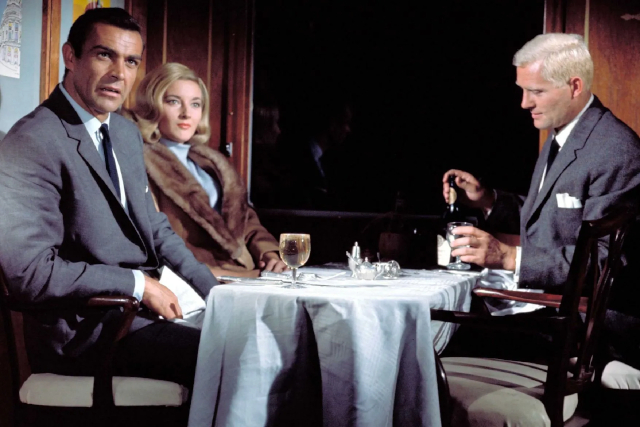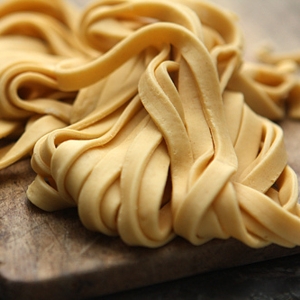I just read a rather detailed post in The Guardian claiming to debunk some common cooking myths. Thing is, many cooks – including me, in some instances – learned these ‘rules’ at their mother’s knee and are wary about contravening them…
 “Red wine with fish? That should have told me something…” James Bond (Sean Connery)
“Red wine with fish? That should have told me something…” James Bond (Sean Connery)
mutters later on, when Spectre agent Red Grant (Robert Shaw) pulls
a gun on him. (From Russia With Love – 1963)
Like the author of the Guardian post, I am a member of the generation whose motto was, “Question authority.” So I decided to examine the most contentious of these ‘myths’ with the goal of awarding them my own thumbs up or thumbs down.
Never drink Red Wine with Fish
Nonsense. Especially when your fish dish is heavily flavoured or spiced, or you’re dining on an oily type of fish. I once thoroughly enjoyed a glass of Merlot with a platter of Blackened Catfish. Though purists might say one should quaff Beer with such entrées.
My number one rule for wine pairing: Your beverage choice should always complement your food and stand up to it, in strength.
Experiment with ‘creative’ wine pairings at home. But stick with the old ‘White only’ rule at restaurants. Particularly snooty ones. No sense offending the sommelier’s or server’s sensibilities. Or suggesting to them that you may be a low-tipping barbarian. Or an undercover Russian spy shadowing James Bond on The Orient Express…
Guardian author Felicity Cloake agrees with me.
Cook Pasta in water ‘as salty as the sea’
May or may not be true. I agree that one should generously salt one’s pasta water. If you don’t overcook your pasta, you won’t give it a chance to absorb too much salt. But if you undersalt it, and stick to the traditional Italian rule of cooking it just until it’s al denté, you may risk serving bland, starchy tasting pasta.
Food writer Anna del Conte says 10 ml / 1 tsp. per litre / quart of water is ideal. I think a good pinch of salt (not quite 1 tsp.; not as little as 1/2 tsp.) is about right.
Cloake offers the opinions of many others, but doesn’t weigh in definitively herself.
Don’t wash your mushrooms
I’ve never washed or peeled my mushrooms, in spite of strong feelings expressed by some culinary influencers to the contrary.
Washing mushrooms is supposed to rid them of remnants of the composted chicken manure most commercial fungi are gown on. Sources I trust – including my instructors at culinary school – agree that using a soft brush to remove compost bits is best. And under no circumstances, subject your mushrooms to water. Washing them just lets them absorb water. And, since they are predominantly composed of water to start with, that’s a recipe for a soggy disaster in the pan.
Cloake agrees.
Removing the seeds from Chili Peppers reduces the heat
This one is a no-brainer. Pure chemistry. The ‘heating’ agent – capsaicin – resides primarily under the skin and in the white membrane that supports the seed blob in the centre of the Pepper.
This is something I learned from my Italian neighbours across the street, when I was just a little kid. The actual flavour of peppers – from Sweet Green Bells to Carolina Reapers – resides in the flesh.
This is a well-known fact among food cognoscenti, and is widely chronicled in print and in web posts such as this one from The Kitchen.
Cloake hearily agrees.
Always sear meat to seal in juices
Nope. You paid crazy high prices for your meat! Don’t ruin it! All searing does is create a dark, umami-laden crust on the meat. But that, in itself, is a very good thing. Dishes like Boeuf Bourguignon and Irish Stew wouldn’t be nearly as savoury and meaty if you just three the raw meat into the liquid-filled pot. Just don’t overdo the sear.
This is an ancient chefs’ secret most home cooks don’t know. More’s the pity.
If you want to conserve juices… Never press down with the spatula on meat on the grill or flattop. Never overcook foods. Boiled/simmered veggies will turn to mush. And grilled/fried meats will turn to leather.
Cloake agrees. Vehemently.
Olive oil is for dressing, not cooking.
Again, nonsense. But only if you watch your temperature. Prof Tim Spector observes, in his book Food for Life, that Olive Oil is great for low-temperature applications – up to about 230 F / 110 C. If you’re contemplating deep frying or stir frying, use a high-temp oil such as Peanut, Canola of Sunflower.
When you cook, use regular daily-use OO. Using costly Virgin or Extra-Virgin would be a waste of money.
If you’ve generally only used Olive Oil for salad dressing, or top-dressing certain dishes that call for a splash of it to finish, you’re missing out on much of what OO has to offer.
Cloake agrees.
Now…
How did you score on this true/false quiz?
~ Maggie J.

